November 21,2003 Nothing cool like this ever happens to Me...
| Man in Peoria finds octopus in his toilet. |  |
A Real case of OverKILL. Link via News of the Weird 11-16-03 edition.
In July, a judge relented and allowed Richard Quinton Gunn to act as his own attorney in his aggravated-murder appeal, following his conviction earlier in the year in Ogden, Utah, by a jury that deliberated just two hours. Gunn had confessed, saying he killed his tenant using a crowbar, a butcher knife, a handsaw, a fireplace poker, a 12-inch bolt, a straight-edge razor, an ax, walking canes, a pool cue and a large salad fork. [Salt Lake Tribune, 7-16-03]
November 20, 2003 Deconstruction and Spiritual Semantics
"Anyone with an interpretation of the scriptures that differs from that of the writer is misled, but not because the scriptures are lying. . . .
 |
[I]f he is deceived in an interpretation that builds up charity, which is the end of the commandments, he is deceived in the same way as a man who leaves a road by mistake but passes through a field to the same place toward which the road itself leads. But he is to be corrected and shown that it is more useful not to leave the road, lest the habit of deviating force him to take a crossroad or a perverse way"- Augustine, On Christian Doctrine |
Deconstruction is a concept I was first introduced to in the late eighties and I was reading in Art Journals as a discipline to help me be a better designer of fine art exhibitions proceeding with the notion that artists, even ones coming from a deconstructionist grounding tend to want their work to be represented appropriately (a notably non-postmodern idea).
| I was working regularly with Art Historians, artists and museums such as the Prado, MOMA, the Metropolitan, and galleries such as Marlborough and Tassende in New York where postmodern concepts held sway as Modernism was heralded as being dead or at least in its last throes of pertinence. | 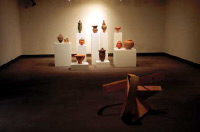 |
The journals of Art History were full of predictions and struggles to lay hold of the concepts that were filtering into the discipline from Literary criticism and the supposed death of traditional interpretations of texts. Hermeneutics suddenly was all the rage.
At that point (late eighties) scholars were still trying to advance the case that we were living in a postmodern era, a place that was clearly marked off from the modern in many of its characteristics. The conversations typically became embroiled in defining modernism, and very little consensus on the question was to be found.
|
Pruitt-Igoe destruction in St. Louis |
One way to understand the milieu that led to the supposed death of modernism is to connect one’s concepts with the contemporary critical-theoretical constructs of structuralism and post-structuralism. |
Roland Barthes took issue of the possibility that the natural must be unmasked as sign.
| It is the position of postmodernism that the meaning of an image cannot be exhausted at the level of communication or symbolic significance-that meaning cannot be based on understanding at the level of meanings consciously intended and consumed publicly. |  |
The university as a world institution has become dominated in its intellectual thought by theorists who took Hegel’s constructs to their logicus terminus. Heroes of this vanguard would include Foucault, Derrida, Barthes and Rorty.
 |
Foucoult died of AIDS and one bright young theorist who contracted the disease is quoted as saying" I die happy because I was infected by Michel Foucoult." |
I think the quote is a commentary on the abject futility of human rebellion against God as described in Romans 1.
A structuralist approach to art takes an attitude towards the sensuous, visual, non semantic aspects of art. Art possesses almost magical magnetism that must be approached at a distance through a discursive aspect that provides a perspective from which to critique it. Critical reflection must take this distancing into consideration. Post structuralism gave these connotations a negative twist.
| Visual pleasure became an impediment to knowing the Real.Post structuralism moved into deconstructionism which posited that these intrinsic qualities of art were in fact unknowable. |  |
So the Real becomes unknowable on its own merits- there can be a close encounter with the Real but it is completely Other. It is sort of a vanishing point which is moved towards but never arrived at. Alan Sheridan called it "the umbilical cord of the symbolic".
 |
This departure from the knowability of truth came in two streams- from Christian and non Christian arenas. |
| The exit from modernity into postmodern was spoken of as a sort of departure from an oppressive Eden that was in itself a fiction that blinded us from the real. |  |
Representation no longer refers to objective things. We cannot read reality or reach it’s irreducible figurality. We do not realize we ourselves are contingencies of the Real. We are not autonomous object with freedom of choice in ideology.The modern myth of progress promised and earthly paradise and it led to destruction. Part of the draw of deconstruction is its unwavering assertations in regard to modernity’s excesses.
 |
As I have written elsewhere, this was manifested in Western art with the throwing off of representational art as a means of communicating the good, the true and the beautiful. |
As truth became unknowable, impressionism, abstraction, Dada and Deconstructionalism held successive sway. Duchamps goal was to destroy the viewer from within himself. Much of postmodern art expresses futility, hopelessness and rage. Yet it is not beyond redemption. God specializes in hopeless causes as that is his prime raw material to work from today, ourselves included.
In some ways the dethroning of certain idols of the West such as the ideas that deny the limitations of universal reason in light of the fall could potentially be said to serve the cause of Christ. Our fundamental brokenness is something modernism excludes from the conversation. The biblical mandate is that man is fallen but not beyond the reach of a redeeming god who is infinite in mercy and even turns that which is meant for evil to good for those found in Christ.
| As the middle class in the West becomes less and less a product of the Reformation, the light will get brighter and the darkness darker, thus the choices will become more obvious. Man is unable to formulate meaning from the diversity of knowledge and a proper relationship between Grace and Nature. |  |
The Bible reveals the only coherent way to approach the problem- man is fallen but valuable because he was created in the image of God and God alone is autonomous. Thus the scriptures alone are the key to understanding the deepest longings of man, the greatest needs and the only way of avoiding hopelessness among those in creation who would pursue an authentic life in the contemporary world.
 |
Deconstruction begins with questioning the assumptions of modernity. A modern approach to interpretation assumes that the author’s original intent in truly "knowable" from the creation itself. Deconstruction asks the question- what were the author’s subliminal or subconscious motivations that express deeper meaning than he/she might have been aware of? Logical structure and coherence imposed upon the text are therefore suspect. Truth becomes unknowable- every reader becomes agnostic. |
Deconstruction goes beyond saying that the real is mysterious- it says it is incoherent. It is satisfied with this incoherence and sees that as interesting in and of itself. Incoherence may actually be elevated by the deconstructionist to the level of genius.
 |
Postmodern deconstruction holds then that all meaning is socially constructed based on a particular view of language. Therefore language cannot render truths about the world. There is the sign and the signifier and they are distinct. |
Any connection between the two is arbitrary. Every cultural artifact becomes a text to be read and deconstructed. Cultural life and intellectual pursuits are intertextualities ant are self referential and circular in meaning. Humans cannot escape the limitations of our bondage to language based meaning.. There is therefore no transcendental logos, no real meaning. Our being is enslaved in a bondage of the word, a prison of language.
| Deconstruction is an attempt to break out of the prisons. They see societies as inherently repressive and are totally antinomian in approach to life. It is a hermeneutics of suspicion since every construct proceeds from a sinister underlying if unconscious motivation. | 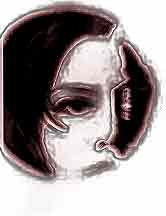 |
With the absence of absolute values to strive for it is an inherently self destructive, not self validating philosophy. Whenever a text is interrogated, critique becomes criticism and a negative connotation is advanced. All truth claims become covert power plays. An intellectually sophisticated contingent of theorists have set forth a rigorous methodology to support their mental gymnastics. The rampant relativism in our culture therefore has a peg to hang its hat on. Truth has become the art of redesigning knowledge since truth does not exist.
While it is true that traditional hermeneutics has operated within the construct of modernism for 200 years, that "interpretation" is in and of itself a modern construct defies the fact that language is essential to humanity and is not in itself a modern concept.
 |
Deconstructionists believe that all words are only referential and do not speak to the Real. There is no one Real interpretation of a text- Shivalike, there are an infinite number of possibilities and no one is to be preferred. There are, in a phrase, no absolutes. |
Such an economy produces bubble communities that create their own morals and norms. They are a law unto themselves. So the implications for those engaged in pursuing and presenting spiritual truth are enormous. As this construct become pervasive in the postmodern culture, all constraints are thrown off. One man’s chaos is another man’s liberty.
In effect every truth claim is turned upside down and becomes the problem rather than the solution. It is a fleshing out of the old chestnut that maybe religion is about perspective- maybe Yahweh is the devil and Lucifer is God.
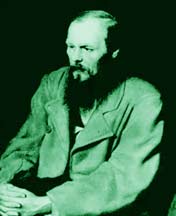 |
If we construct our own reality then rather we are god- we write the metanarratives that we sing. As Dostoevsky said, "If God is dead then everything is permissible". |
So in this milieu we are left with several possibilities. We can accept the meaningless and embrace the "unbearable lightness of being". We can hunker in the bunker and deny the signs of the times, play the game and take the blue pill. We can focus on our little island of the world, or we can become terrorists and construct our own reality.
| Every theory is reached by thinking. To deny the thought is to deny it’s product. Postmodern deconstruction bites the hand that feeds it in this way. It is intrinsically self contradictory and likes it that way, delighting in the consensus that there can be no consensus. It is thought that destroys its own credentials- sounds sort of like the fall of Lucifer and the fall of man. | 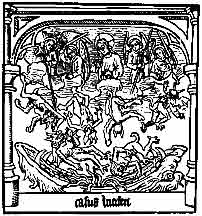 |
One can tell from the foregoing that this has tremendous impact on the pursuit of spiritual truth in our day and age. At one time in history the participants in the dialogue had common presupposition in the existence of absolutes- the idea was to navigate the cultural differences to distill the truth out of the complexity. Kant and Hegel took philosophy down the slippery slope away from this presupposition.
 |
Kant built a moral universe based on man’s existence alone, without the need for God. He believed man could be the reference point for what is true. Synthesis, not thesis or antithesis was the nature of truth. Every philosophy that descends from these thinkers are unworkable ultimately for the lack of that absolute reference point, God. |
| From Kierkegaard’s leap of faith to abstract notions of final experience and self authentication, took truth beyond verification. Verily verily became impossible, not just a hard saying. |  |
The one place we do not need to retreat from is the Bible. Sensitivity to suffering and an understanding of the effects of the fall must enlighten our discourse with the world, since these two issues produced the excesses of modernity and in turn gave rise to the excesses of postmodern reaction to them. Postmodernism has no basis for truth claims and therefore can only play the role of the contrarian in the discussion.
We have the truth- it is not an idea or a construct, it is a person. Truth is a gift and truth is a call. Forms of spirituality are referential and are only as good as the objective reference of their constructions. We are called to be conformed to a person and that person is truth. Our function which is to glorify and enjoy that person forever gives rise to a multitude of forms that must be critiqued in regard to their efficacy in pursuing and realizing that purpose.
| One thing that flows from our discourse with deconstructionists is that we must put our money where our mouth is. If we have real truth, that truth must have consequences. For the purpose of that revealed truth is transformation of our nature to the nature of the most High God. That makes the Bible much more dangerous than most modern or postmodern evangelicals have ever surmised. |
Authentic appropriation of the truth- living, moving and having our being in Him shatters our categories. You have do deal with the hardness of the text- it means what it says. It means that you are to love your enemies. If it shatters orthodox theological categories in submission to the text we have become more of a reaction to modernism than deconstruction could ever dream to do. We would become the ultimate deconstructionists.
That is not to say that we would cease to learn from those entrusted with the faith once given to the saints in every generation. Rather we would appreciate their expressions of faith with a new vigor. We master the timeless truths, yes, but move beyond them to the person who indwells us to lead us to all truth. We would read the spirit 0f scripture, not the codified constructs that limit its ability to separate between bone snd marrow, to be a fire in our bones because we’ve grown accustomed to the grace displayed there.
That said we can construct a life that flows from our purpose and is not reactionary or needs driven- a life that exists for the sole person of making much of God and little of ourselves, of glorifying Him in declaration, word, deed and very breath itself.
We must not succumb to the notion that we must alter the understanding or even the content of the Christian faith in order to be acceptable to the deconstructionist. Metanarratives must not be abandoned.
| Another approach would be to alter the form of leading postmoderns to the truth. Formal concerns for presentation must be adjusted. Those who hold to making propositional presentations in a narrative manner would approach the dissemination of truth in this way. |
Another approach is that people are not actually operating under different paradigms today and that truth is self authenticating= the kerygma- the convicting, illuminating power of the Holy Spirit transcends human frailties. Others would contend that presuppositional apologetics are still effective since men are still rational creatures. I tend to agree with the former but not the latter.
I think we must become instigators of conversations- the great commission is to go, teach, but the methodologies must undergo appropriate audience analysis. The forms must change but the message preserved. This acknowledgement of the complexity of what it takes to be a hearer in the current milieu is tremendously important. The Holy Spirit inhabits the words of God presented faithfully and with shrewd understanding and makes of them words of faith that work regeneration in the hearts of men.
A real way this can work in practical terms is to force the deconstructionist to face the fact that he cannot consistently live out the belief system he has constructed for himself. The art of pushing people to the end of their view may be able to force them to desire to move beyond their approach.
In any discussion of deconstruction and it’s relation to the faith, it must be declared that much of what one reads in anti-scriptural in its emphasis. Modern evangelicalism reveals its fatal flaw in its approach to deconstruction. Since Christians express their faith through action, not theory, it is said that Christianity has everything to do with the individual. In fact the individual only has meaning in relation to the ONE- it is all about Him and not about us.
| Self examination, even under the auspices of faith, can lead to an insidious egocentrism. We are to lead examined lives but the examination must always be geared towards getting to truth- God’s perspective that is transformative in nature. |  |
It’s His kindness that leads us to repentance and all self examination must be related to the one we are in relationship with, for that changes everything.
Most Christian discourse elevates the faith to be ABOUT us- "He took the fall and thought of me above all" is an inherently flawed and unscriptural notion. We are recipients of the overflow of the workings of grace- it is all about making much of God and His glory that we bask in. the notion that id we were the only one in the world he still would have died for us says much more about the obscenity of our own individual responsibility for our personal sin than of our value to a holy and Righteous giver of grace.
 |
Man’s propensity is to see the work of Christ as man centered is akin to out propensity for exalting criminals to the status of folk heroes. |
Rationalists have even provided for us an alternative "positive deconstruction" approach to presuppositional apologetics. I believe that the more effective approach is an incarnational apologetic of engaging people personally where possible and declaring truth in all places at all times possible whether we have a platform or not. This was the approach to the 7O Christ sent out and Paul’s approach before - he didn’t take time to be buddies with Felix, but did in other cases make personal relationships the context for his witness. Attempts to reduce truth declaration to certain preferred forms belies the nature of mission- to make His glory know to as many as possible so they can enjoy Him forever.
| So for our spirituality to have any meaning in this brave new world- it must be authentic and it can only be authentic if it is true to its author and finisher. It is grounded in the God glorifying work of Christ and his regard for the prize set before Him- to return to the state of glory he shared from the beginning and to make for us an entry into it ourselves. If in that we bask and make our boast, we surely have something to offer a hopeless world that seeks to authenticate itself in a myriad of counterfeit ways. | 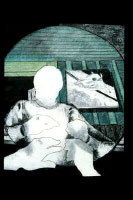 |
In the process of living authentically before the throne of grace, we become the art of God. We become the sign , representing the signifier in authentic ways, (and by grace, significant ways) ever new and creative ways, ever glorious from glory to glory in all His ways. This is the call to Christians today- to enrich the semantics of the Christian dialog with the world by the authenticity of the narratives of our lives lived out and our declarations articulated incisively. Influence, compel, enlighten- fan the fire by becoming the flame.
Links-
Interesting take from evangelical voices at
Youth resources sites have more pertinent info I think, for instance check out
Maybe one of the most spiritually thoughtful men in our generation has a say here and here.Allelon has some pertinent takes on the discussion
Another good reading room...
